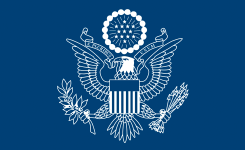- PfP-NATO Network
- C5+1 Security Working Group Meets in Dushanbe
C5+1 Security Working Group Meets in Dushanbe
Dushanbe, Tajikistan, May 16, 2019 – On Thursday, May 16, Tajikistan co-hosted a meeting of the C5+1 Security Working Group with representatives from Kazakhstan, the Kyrgyz Republic, Turkmenistan, Uzbekistan, and the United States at the National Library in Dushanbe. Mark Moody, Acting Deputy Assistant Secretary for Central Asia at the U.S. State Department, led the U.S. delegation with the participation of U.S. Ambassador to Tajikistan John Mark Pommersheim, and Deputy Foreign Minister Muzaffar Huseinzoda led the Tajik delegation. The group discussed regional cooperation in counterterrorism and the threat of returning foreign fighters.
At the meeting Ambassador Pommersheim noted, “The region’s genuine sovereignty, independence, and territorial integrity continue to be of the utmost importance to the United States, and we will continue to work through the C5+1 and our bilateral efforts to ensure those important goals.” Acting Deputy Assistant Secretary Moody and the delegates discussed regional projects to counter violent extremism, including past and future C5+1 workshops on how to utilize community policing, religious tolerance, youth engagement and social media to prevent violent extremist recruitment. The group also discussed plans for future C5+1 meetings.
The C5+1 is a format for dialogue and a platform for joint efforts to address common challenges faced by the United States and the five Central Asian states. At the first C5+1 ministerial, held in Samarkand in November 2015, the six foreign ministers agreed to focus on three sectors of common interest – security, economics, and environmental challenges. At the second C5+1 ministerial, held in Washington in August 2016, the six ministers agreed to launch five projects across these three sectors, supported by a $15 million appropriation from the U.S. Congress. Since the inception of the C5+1 dialogue, the Central Asian countries have been increasingly interested in regional approaches and view the C5+1 as a catalyst for common action.
By U.S. Embassy Dushanbe



